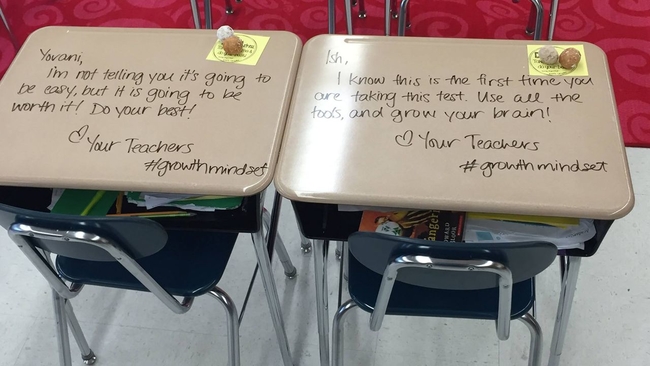Don’t blame that inconsistency on journalist Adam Clark: typically writers have no control over headlines. Nonetheless, he’s stuck with the problem that his article on New Jersey’s latest state assessments
, known as PARCC for the moment, is topped by the headline “Most NJ Kids Failed the State Math Exam (Again),” although his story accurately conveys great news: our students are rising to the challenge of higher standards that reflect the skill sets necessary for life after high school. The right headline is within the text of the article: “scores on both the state math and English tests continued to rise.”
- Example: last year 59 percent of 7th grade students met or exceeded expectations in English Language Arts (ELA). This year 62.7 percent did.
- Example: last year 41.4 percent of students met or exceeded expectations in Algebra 1. This year 45.8 percent did.
- Example: last year 46 percent of 10th graders met or exceeded expectations in ELA. This year 50.7 percent did.
Yes, we have a ways to go. But anyone paying attention knows this already, at least if they keep abreast of our NAEP scores,
considered the “gold standard” for accurately assessing student proficiency. According to NAEP, most NJ students “fail” these highly-regarded tests that assess 4th and 8th graders in math and ELA, among other subjects. Here’s a comparison between last year’s NAEP and PARCC scores for New Jersey students:
Our old ASK (grades 3-8) and HSPA (high school) tests artificially inflated New Jersey students’ proficiency, leading families to believe the pretense that 90 percent of students were mastering grade-level course content. (Former Education Commissioner Lucille Davy once referred to the HSPA, intended to gauge student proficiency in 11th grade math and ELA, as “a middle-school level test.”) Now we have accurate tests that unveil the pretense.
But honesty about student proficiency doesn’t sit well with those invested in the myth of universal success among New Jersey students. And that’s why Governor Murphy and Ed. Commissioner Lamont Repollet want to revert back to assessments that perpetuate the pretense of NJ’s educational prowess. That’s good campaign copy (Murphy: “I’ll get rid of PARCC on Day 1”) but bad for students and families, who rely on accurate assessments to provide accurate information on student proficiency and school quality.
Steve Baker, NJEA spokesman for delusional thinking, told Clark, “those [PARCC] scores fail to meaningfully measure either student learning or teacher effectiveness.” But they do
meaningfully measure student learning, a fact buttressed by the reality that 46 percent of N.J. first-time college students (not including transfer students) have to take non-credit remedial courses because of lack of college and career readiness. (See yesterday’s post.) And, hey, even Diane Ravitch, the doyenne of anti-accountability, considers NAEP data exemplary. Our PARCC scores mirror NAEP pretty closely; if anything, they’re higher. (See chart above.)
Patricia Morgan of JerseyCAN told Clark, “”These results demonstrate that the academic standards and assessments that we have in place are working to ensure more students are college and career ready.” Yet Governor Murphy and Ed. Commissioner Lamont Repollet are determined to dismantle them in order to satisfy lobbying groups addicted to the honesty gap. (NJEA and Education Law Center, looking at you.)
I vote for accurate assessments of student growth and proficiency. That’s what PARCC (or whatever we want to call it) offers. The other option is to return to the bad old days of pretense, false promises, and dishonesty. Sure, the truth hurts. But that’s better than fakery, right? Rising scores show that our kids are up to the challenge. Now the adults must muster the fortitude and commitment to trust that our students and teachers will continue their upward trajectory. Anything else stinks of cowardice.



1 Comment